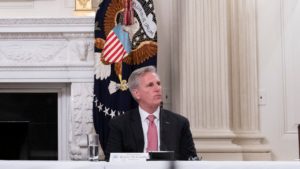
House Minority Leader Rep. Kevin McCarthy, R-Calif., listens to remarks Friday, May 8, 2020, in the State Dining Room of the White House. (Official White House Photo by Shealah Craighead)
Now that Kevin McCarthy has secured the Speakership, it remains to be seen if he and his caucus are willing to do what it takes to save America from a potential debt-fueled implosion. Former congressman and presidential candidate, Dr. Ron Paul, discusses his doubts about McCarthy’s ability to save America from itself. He writes at the Ron Paul Institute:
This week the US government reached its 31.4 trillion dollars borrowing limit, better known as the “debt ceiling.” This led to a showdown among House Republicans, President Biden, and congressional Democrats.
House Republicans are demanding that President Biden and Senate Democrats agree to include spending cuts with the debt ceiling increase. However, President Biden and the congressional Democrats are refusing to negotiate with Republicans. Rather, they and their allies in the mainstream media are lambasting Republicans for their “irresponsibility” in seeking to include spending cuts with an increase in the debt ceiling.
America’s national debt is approximately 122 percent of the gross domestic product (GDP), meaning the government owes more than the population produces. Interest payments on the national debt follow in size behind other federal budget big spending areas of Social Security, Medicare, and “defense.” While interest payments are made, the national debt continues to grow each year.
Government spending steals resources from the private sector. Thus, there is less capital available for private businesses to grow and create new jobs. Government spending also contributes to price inflation and the declining value of the dollar as the Federal Reserve monetizes the debt. One reason the Fed cannot allow interest rates to rise anywhere near where they would be in a free market is that it would cause the federal government’s interest payments to rise to unsustainable levels. Considering these facts, it should be clear that the irresponsible ones are those who think the government should increase its credit limit without cutting spending.
This is not to say that establishment Republicans like House Speaker Kevin McCarthy are heroes of fiscal restraint. Rather, McCarthy, like most Republicans, objected neither to increased spending nor to debt ceiling suspensions when Donald Trump was president. Further, any Republican spending plan will likely continue increasing spending on the military-industrial complex while refusing to address the looming cost problems with Social Security and Medicare.
While some Republicans are willing to discuss reforms to Social Security and Medicare, most are still too afraid of the “senior lobby” to support any changes in the programs — even if such changes will not harm current beneficiaries. Consequently, it is unlikely Congress will pass meaningful entitlement reform — at least until it is forced to do so because the Medicare and Social Security Trust Funds run out of money. Insolvency is projected for the Medicare Trust Fund in five years and for the Social Security Trust Fund in 12 years. Of course, Congress may be able to avoid making tough choices since the Federal Reserve will likely cut government benefits, along with workers’ wages and the value of savings, via the inflation tax.
Read more here.
If you’re willing to fight for Main Street America, click here to sign up for my free weekly email.





